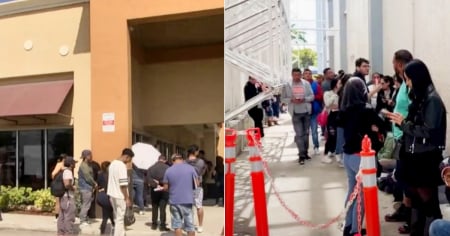Álvaro Fernando Medina Melo, a 38-year-old Cuban resident of Florida, was detained by Immigration and Customs Enforcement (ICE) officials after attending his fourth routine appointment at the offices in Miramar, Broward County.
Medina, who was out on parole with a I-220A form, is now facing a deportation process that has raised concerns in the Cuban community.
Univisión interviewed the lawyer representing Medina. She noted that his detention is an "abuse of discretion" by ICE, as the Cuban has no criminal record, maintains an exemplary work history, and is the primary provider for his family, including his daughter, who is diagnosed with severe autism.
Glenny Stack, the wife of the detainee, pleaded with the authorities not to proceed with the deportation, arguing that the girl is economically, physically, and emotionally dependent on her father.
The legal defender of Medina explained that the critical point in his case is an old deportation order, stemming from his first unsuccessful attempt to enter the United States in 2019.
Subsequently, in a second attempt, Medina was released under the I-220A status. Despite attending his routine appointments, ICE decided to detain him, leaving his family in uncertainty. They are now gathering signatures to request his release and to prevent a possible repatriation to Cuba or to a prison in Guantánamo.
The situation has raised alerts among Cubans with I-220A, who until now considered themselves exempt from the deportations initiated by the Donald Trump administration.
However, immigration lawyers have emphasized that each case is unique and the authorities are reviewing the files with greater scrutiny.
The renowned Florida attorney, Willy Allen, in statements to CiberCuba, expressed optimism regarding the defense of Cubans with I-220A.
"We are going to win in a Federal Court. Present a strong asylum case. We may have to fight," stated Allen, who dismissed the possibility of mass deportations for those who entered under that immigration status.
Allen recalled that the Cuban Adjustment Act has been in place since 1966 and there's no need to come up with anything new. In his view, that is the path that immigrants from Cuba should follow.
The detention of Medina occurs in a context of . Since the beginning of Donald Trump's administration, benefits such as parole, the CBP One application, and Temporary Protected Status (TPS) for certain groups of immigrants have been eliminated.
In addition, deportations to Mexico, Venezuela, and Colombia, among other countries in the Central American region, have resumed, increasing uncertainty among migrant communities.
Medina remains detained. His family in Florida continues to demand his release and protection under the Cuban Adjustment Act.
Frequently Asked Questions about the Detention and Deportation of Cubans with I-220A in the U.S.
What does the I-220A form imply for Cubans in the United States?
The I-220A form indicates supervised release and allows Cubans to remain in the U.S. while their immigration status is determined. However, it is not an official admission document, which keeps its holders in a state of legal uncertainty.
Why Álvaro Medina could be deported despite having an I-220A?
Álvaro Medina is facing a deportation process due to a prior deportation order stemming from a failed entry attempt in 2019. Despite attending his immigration appointments, ICE decided to detain him, which has raised concerns within the Cuban community in Florida.
What should Cubans do with I-220A to avoid deportation?
Cubans with I-220A must stay updated with their immigration appointments and submit a strong asylum claim if they have a solid legal basis. Consulting with immigration attorneys is crucial to explore legal options and avoid potential deportations.
How does the Cuban Adjustment Act affect Cubans with I-220A?
The Cuban Adjustment Act allows Cubans to apply for permanent residency after one year in the U.S. However, Cubans with I-220A face uncertainties because this form is not recognized as an official admission, complicating their status adjustment process.
Filed under:
